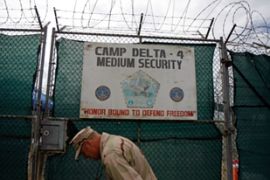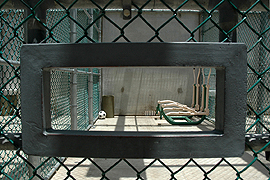Obama orders Guantanamo closure
Camp to close within one year as US president also bans harsh interrogations.

“The message that we are sending around the world is that the United States intends to prosecute the ongoing struggle against violence and terrorism,” Obama said.
“We are going to do so vigilantly; we are going to do so effectively; and we are going to do so in a manner that is consistent with our values and our ideals.”
Obama had promised to close the detention centre during his election campaign.
Prisoners’ future
Guantanamo was set up by the Bush administration in 2002 to hold prisoners it detained as part of its so-called war on terror.
More than 240 prisoners remain held there, including Khalid Sheikh Mohammed, who is suspected of planning the September 11 attacks on the US.
The Bush administration has said it wants to try about a third of the remaining detainees.
Others cannot be returned to their home countries, for fear they may be tortured.
 |
| Guantanamo prisoners will be treated in a manner consistent with international law [AFP] |
The White House said the order closing Guantanamo also sets up a series of reviews to determine whether it is possible to transfer prisoners to their home countries, if US national security is not threatened.
If that is not possible, the review will then look at options for prosecuting them, the White House said in a statement.
The order also orders that all prisoners held at Guantanamo be held in a manner consistent with the Geneva Conventions until the facility is closed.
Al Jazeera’s Anand Naidoo in Washington DC said it was likely that the five men facing charges over the September 11 attacks would face some kind of prosecution on US soil.
Obama also said he was setting up a task force that would recommend policies on handling “terror” suspects who are detained in future.
The force would look at where those detainees should be held instead of Guantanamo.
Insufficient evidence
Tim McCormack, professor of international humanitarian law at the University of Melbourne, said that the US government has a challenge in determining the future of some detainees.
“There is clearly a majority of detainees who will never be tried because there is insufficient evidence against them,” he told Al Jazeera.
“If they are released, where will they go? It seems that some detainees would face the real threat of persecution and even torture if they return to their home countries.
 |
| Rendition of al-Qaeda suspects could continue [GALLO/GETTY] |
“So then, the US has to decide if it will take them into the US or send them to friendly states such as Australia and the United Kingdom. How ironic would that be – that some of these people, who are allegedly among the worst of the worst, could end up as citizens of the allied countries that were complicit in the US system in the first place.”
On Wednesday, Obama had requested a halt to military tribunals of al-Qaeda suspects held at the camp, including those suspected of involvement in the September 11 attacks.
Shane Kadidal, a senior lawyer at the Guantanamo Global Justice Initiative, which works on behalf of detainees, told Al Jazeera the move was a step in the right direction.
“We’ve always said that these military commissions were insupportable. The system was designed to launder evidence gained through torture and all those cases should be transferred to ordinary federal courts.”
Legal advice
The order ending harsh interrogations also requires that all interrogations follow the US Army’s Field Manual interrogation guidelines, which ban the use of techniques such as “waterboarding,” which simulates the sensation of drowning.
The order bans the CIA from operating secret prisons, and forbids them from opening any new such facilities.
It also ends US government reliance on a series of controversial legal advice notes on the treatment of prisoners drawn up by Bush administration advisers.
The order does not ban the controversial practice of rendition, which involves the secret detention and transfer of “terror” suspects from one country to another.
It does, however, order a review of the practice.
Obama also issued a memorandum ordering a review of the case of Ali Saleh Kahlah al-Marri, a Qatari citizen and the only “enemy combatant” held on US soil at a Navy prison in South Carolina.